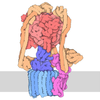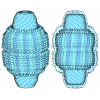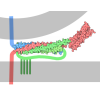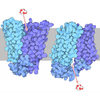[English] 日本語
 Yorodumi
Yorodumi- PDB-9b8p: Synaptic Vesicle V-ATPase with synaptophysin and SidK, State 3, V1 -
+ Open data
Open data
- Basic information
Basic information
| Entry | Database: PDB / ID: 9b8p | ||||||
|---|---|---|---|---|---|---|---|
| Title | Synaptic Vesicle V-ATPase with synaptophysin and SidK, State 3, V1 | ||||||
 Components Components |
| ||||||
 Keywords Keywords | PROTON TRANSPORT / Mmebrane / Synaptic / Complex | ||||||
| Function / homology |  Function and homology information Function and homology informationIon channel transport / Transferrin endocytosis and recycling / Amino acids regulate mTORC1 / symbiont-mediated suppression of host phagosome acidification / Insulin receptor recycling / proton-transporting V-type ATPase, V1 domain / synaptic vesicle lumen acidification / P-type proton-exporting transporter activity / extrinsic component of synaptic vesicle membrane / cellular response to increased oxygen levels ...Ion channel transport / Transferrin endocytosis and recycling / Amino acids regulate mTORC1 / symbiont-mediated suppression of host phagosome acidification / Insulin receptor recycling / proton-transporting V-type ATPase, V1 domain / synaptic vesicle lumen acidification / P-type proton-exporting transporter activity / extrinsic component of synaptic vesicle membrane / cellular response to increased oxygen levels / vacuolar proton-transporting V-type ATPase, V1 domain / clathrin-coated vesicle membrane / proton-transporting V-type ATPase complex / protein localization to cilium / vacuolar proton-transporting V-type ATPase complex / vacuolar acidification / regulation of cellular pH / ROS and RNS production in phagocytes / Neutrophil degranulation / ATPase complex / microvillus / cilium assembly / proton-transporting ATPase activity, rotational mechanism / ATP metabolic process / H+-transporting two-sector ATPase / ruffle / proton transmembrane transport / secretory granule / synaptic vesicle membrane / melanosome / ATPase binding / intracellular iron ion homeostasis / endosome / cilium / apical plasma membrane / centrosome / ATP hydrolysis activity / ATP binding / membrane / plasma membrane / cytosol / cytoplasm Similarity search - Function | ||||||
| Biological species |  Legionella pneumophila subsp. pneumophila str. Philadelphia 1 (bacteria) Legionella pneumophila subsp. pneumophila str. Philadelphia 1 (bacteria) | ||||||
| Method | ELECTRON MICROSCOPY / single particle reconstruction / cryo EM / Resolution: 3.2 Å | ||||||
 Authors Authors | Coupland, E.M. / Rubinstein, J.L. | ||||||
| Funding support |  Canada, 1items Canada, 1items
| ||||||
 Citation Citation |  Journal: Science / Year: 2024 Journal: Science / Year: 2024Title: High-resolution electron cryomicroscopy of V-ATPase in native synaptic vesicles. Authors: Claire E Coupland / Ryan Karimi / Stephanie A Bueler / Yingke Liang / Gautier M Courbon / Justin M Di Trani / Cassandra J Wong / Rayan Saghian / Ji-Young Youn / Lu-Yang Wang / John L Rubinstein /  Abstract: Intercellular communication in the nervous system occurs through the release of neurotransmitters into the synaptic cleft between neurons. In the presynaptic neuron, the proton pumping vesicular- or ...Intercellular communication in the nervous system occurs through the release of neurotransmitters into the synaptic cleft between neurons. In the presynaptic neuron, the proton pumping vesicular- or vacuolar-type ATPase (V-ATPase) powers neurotransmitter loading into synaptic vesicles (SVs), with the V complex dissociating from the membrane region of the enzyme before exocytosis. We isolated SVs from rat brain using SidK, a V-ATPase-binding bacterial effector protein. Single-particle electron cryomicroscopy allowed high-resolution structure determination of V-ATPase within the native SV membrane. In the structure, regularly spaced cholesterol molecules decorate the enzyme's rotor and the abundant SV protein synaptophysin binds the complex stoichiometrically. ATP hydrolysis during vesicle loading results in a loss of the V region of V-ATPase from the SV membrane, suggesting that loading is sufficient to induce dissociation of the enzyme. | ||||||
| History |
|
- Structure visualization
Structure visualization
| Structure viewer | Molecule:  Molmil Molmil Jmol/JSmol Jmol/JSmol |
|---|
- Downloads & links
Downloads & links
- Download
Download
| PDBx/mmCIF format |  9b8p.cif.gz 9b8p.cif.gz | 966.5 KB | Display |  PDBx/mmCIF format PDBx/mmCIF format |
|---|---|---|---|---|
| PDB format |  pdb9b8p.ent.gz pdb9b8p.ent.gz | Display |  PDB format PDB format | |
| PDBx/mmJSON format |  9b8p.json.gz 9b8p.json.gz | Tree view |  PDBx/mmJSON format PDBx/mmJSON format | |
| Others |  Other downloads Other downloads |
-Validation report
| Summary document |  9b8p_validation.pdf.gz 9b8p_validation.pdf.gz | 1.7 MB | Display |  wwPDB validaton report wwPDB validaton report |
|---|---|---|---|---|
| Full document |  9b8p_full_validation.pdf.gz 9b8p_full_validation.pdf.gz | 1.8 MB | Display | |
| Data in XML |  9b8p_validation.xml.gz 9b8p_validation.xml.gz | 129.5 KB | Display | |
| Data in CIF |  9b8p_validation.cif.gz 9b8p_validation.cif.gz | 199.6 KB | Display | |
| Arichive directory |  https://data.pdbj.org/pub/pdb/validation_reports/b8/9b8p https://data.pdbj.org/pub/pdb/validation_reports/b8/9b8p ftp://data.pdbj.org/pub/pdb/validation_reports/b8/9b8p ftp://data.pdbj.org/pub/pdb/validation_reports/b8/9b8p | HTTPS FTP |
-Related structure data
| Related structure data |  44351MC  9b8oC  9b8qC  9brbC  9brcC  9brdC M: map data used to model this data C: citing same article ( |
|---|---|
| Similar structure data | Similarity search - Function & homology  F&H Search F&H Search |
- Links
Links
- Assembly
Assembly
| Deposited unit | 
|
|---|---|
| 1 |
|
- Components
Components
-Protein , 3 types, 7 molecules ABCHQRS
| #1: Protein | Mass: 71483.438 Da / Num. of mol.: 3 / Source method: isolated from a natural source / Source: (natural)  References: UniProt: D4A133, H+-transporting two-sector ATPase #3: Protein | | Mass: 28359.020 Da / Num. of mol.: 1 / Source method: isolated from a natural source / Source: (natural)  #7: Protein | Mass: 65505.297 Da / Num. of mol.: 3 Source method: isolated from a genetically manipulated source Source: (gene. exp.)  Legionella pneumophila subsp. pneumophila str. Philadelphia 1 (bacteria) Legionella pneumophila subsp. pneumophila str. Philadelphia 1 (bacteria)Gene: lpg0968 / Production host:  |
|---|
-V-type proton ATPase subunit ... , 4 types, 10 molecules DEFIJKLMNO
| #2: Protein | Mass: 56611.570 Da / Num. of mol.: 3 / Source method: isolated from a natural source / Source: (natural)  #4: Protein | Mass: 26167.453 Da / Num. of mol.: 3 / Source method: isolated from a natural source / Source: (natural)  #5: Protein | | Mass: 13389.262 Da / Num. of mol.: 1 / Source method: isolated from a natural source / Source: (natural)  #6: Protein | Mass: 13690.476 Da / Num. of mol.: 3 / Source method: isolated from a natural source / Source: (natural)  |
|---|
-Non-polymers , 1 types, 1 molecules 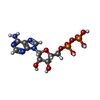
| #8: Chemical | ChemComp-ADP / |
|---|
-Details
| Has ligand of interest | N |
|---|
-Experimental details
-Experiment
| Experiment | Method: ELECTRON MICROSCOPY |
|---|---|
| EM experiment | Aggregation state: PARTICLE / 3D reconstruction method: single particle reconstruction |
- Sample preparation
Sample preparation
| Component | Name: Synaptic Vesicle V-ATPase with synaptophysin and SidK, State 3, V1 Type: COMPLEX / Entity ID: #1-#7 / Source: MULTIPLE SOURCES |
|---|---|
| Source (natural) | Organism:  |
| Buffer solution | pH: 7.4 |
| Specimen | Embedding applied: NO / Shadowing applied: NO / Staining applied: NO / Vitrification applied: YES |
| Vitrification | Cryogen name: ETHANE |
- Electron microscopy imaging
Electron microscopy imaging
| Experimental equipment |  Model: Titan Krios / Image courtesy: FEI Company |
|---|---|
| Microscopy | Model: TFS KRIOS |
| Electron gun | Electron source:  FIELD EMISSION GUN / Accelerating voltage: 300 kV / Illumination mode: FLOOD BEAM FIELD EMISSION GUN / Accelerating voltage: 300 kV / Illumination mode: FLOOD BEAM |
| Electron lens | Mode: BRIGHT FIELD / Nominal defocus max: 1900 nm / Nominal defocus min: 1000 nm |
| Image recording | Electron dose: 37.5 e/Å2 / Film or detector model: TFS FALCON 4i (4k x 4k) |
- Processing
Processing
| EM software | Name: PHENIX / Version: 1.21_5207 / Category: model refinement |
|---|---|
| CTF correction | Type: PHASE FLIPPING AND AMPLITUDE CORRECTION |
| 3D reconstruction | Resolution: 3.2 Å / Resolution method: FSC 0.143 CUT-OFF / Num. of particles: 198533 / Symmetry type: POINT |
 Movie
Movie Controller
Controller







 PDBj
PDBj